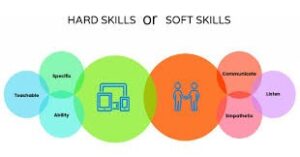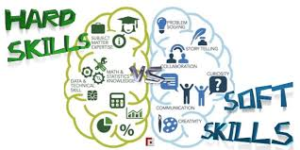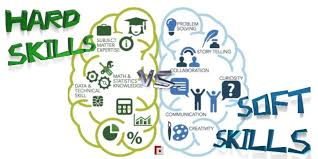There are no losers or winners when it comes to soft skills and hard skills! Both are important for your career and you. This includes both hard skills (job skills) and soft skills (character traits and abilities).

It’s easy to describe hard skills, as it’s a nice way of saying the skills you’ve acquired during your education and work life. Your basic education will form the foundation of your profile. This is followed by your degree from university and any relevant work experience.
A reference, a certificate, or a test can be used to demonstrate job skills. In some cases, they can be demonstrated actively. Hard skills are so named because they are tangible.
Hard skills examples
Hard skills are built on and improve with experience. The requirements for hard skills will vary depending on the job.
Evidence of Hard Skills includes:
- School diplomas
- Academic degrees: Bachelor’s, Master’s, etc.
- Students and graduates can gain valuable work experience through internships, student jobs and other forms of employment.
- Certificates: further education, seminars, trainer certificate, etc.
- Skills in software: SAP, Office, graphics, content management, etc.
- Programming languages
- Foreign languages: Semester abroad, language courses, etc.
With time and better knowledge, your skills are only going to improve. There’s no reason to be concerned if you don’t have all the skills listed. You can develop your skills gradually, for example by learning through experience or in a specific training. This is something that employers who are looking to hire young professionals know.
Soft skills are at least as valuable as hard skills, according to most employers. For help developing soft skills, consider a Gloucester Business Coach from https://www.randall-payne.co.uk/services/business-advisory/business-coaching/

Here is a definition of soft skills: These are your personal skills, personality traits, behaviours, attitudes, and characteristics, which go beyond the concrete job skills you’ve learned. These skills are called “soft” as they can’t be quantified (unlike hard ones which can be classified and measured).
Some examples of soft skills that are often required include:
- Team-working skills
- Strong communication skills
- Conflict resolution and critical thinking skills
- Analytical thinking
- Flexibility
- Creativity
- Empathy
- Organisational skills
- Ability to understand new concepts quickly
- Independence
You and your personality are made up of many strengths and depending on the position and industry, you may have other skills that qualify you. You can think of your soft skills to be what sets you apart from the other candidates on your search for your dream position.


